The AMD Zen and Ryzen 7 Review: A Deep Dive on 1800X, 1700X and 1700
by Ian Cutress on March 2, 2017 9:00 AM ESTBenchmarking Performance: CPU Encoding Tests
One of the interesting elements on modern processors is encoding performance. This includes encryption/decryption, as well as video transcoding from one video format to another. In the encrypt/decrypt scenario, this remains pertinent to on-the-fly encryption of sensitive data - a process by which more modern devices are leaning to for software security. Video transcoding as a tool to adjust the quality, file size and resolution of a video file has boomed in recent years, such as providing the optimum video for devices before consumption, or for game streamers who are wanting to upload the output from their video camera in real-time. As we move into live 3D video, this task will only get more strenuous, and it turns out that the performance of certain algorithms is a function of the input/output of the content.
7-Zip
One of the freeware compression tools that offers good scaling performance between processors is 7-Zip. It runs under an open-source licence, is fast, and easy to use tool for power users. We run the benchmark mode via the command line for four loops and take the output score.
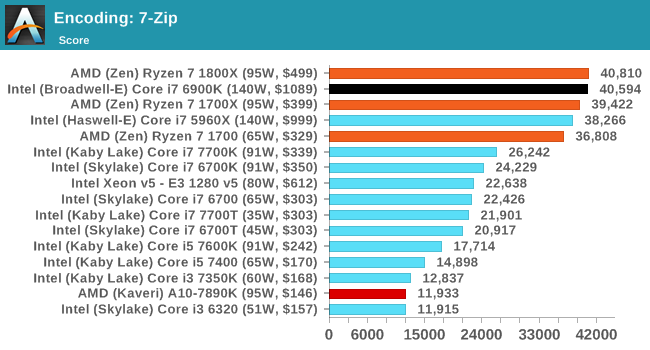
WinRAR 5.40
For the 2017 test suite, we move to the latest version of WinRAR in our compression test. WinRAR in some quarters is more user friendly that 7-Zip, hence its inclusion. Rather than use a benchmark mode as we did with 7-Zip, here we take a set of files representative of a generic stack (33 video files in 1.37 GB, 2834 smaller website files in 370 folders in 150 MB) of compressible and incompressible formats. The results shown are the time taken to encode the file. Due to DRAM caching, we run the test 10 times and take the average of the last five runs when the benchmark is in a steady state.
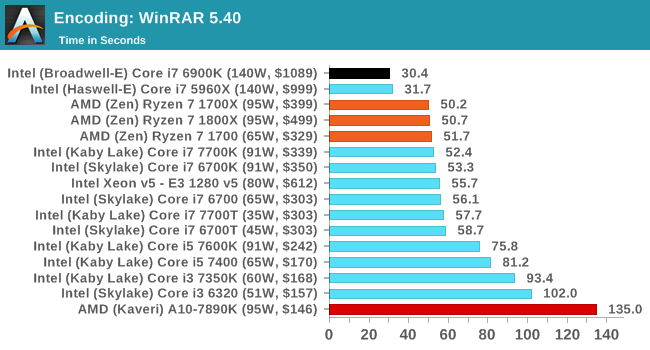
AES Encoding
Algorithms using AES coding have spread far and wide as a ubiquitous tool for encryption. Again, this is another CPU limited test, and modern CPUs have special AES pathways to accelerate their performance. We often see scaling in both frequency and cores with this benchmark. We use the latest version of TrueCrypt and run its benchmark mode over 1GB of in-DRAM data. Results shown are the GB/s average of encryption and decryption.
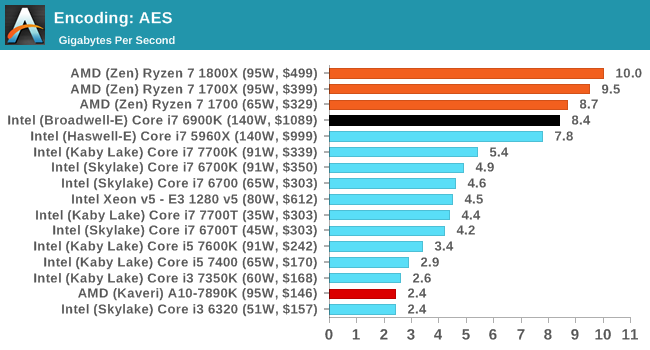
HandBrake H264 and HEVC
As mentioned above, video transcoding (both encode and decode) is a hot topic in performance metrics as more and more content is being created. First consideration is the standard in which the video is encoded, which can be lossless or lossy, trade performance for file-size, trade quality for file-size, or all of the above can increase encoding rates to help accelerate decoding rates. Alongside Google's favorite codec, VP9, there are two others that are taking hold: H264, the older codec, is practically everywhere and is designed to be optimized for 1080p video, and HEVC (or H265) that is aimed to provide the same quality as H264 but at a lower file-size (or better quality for the same size). HEVC is important as 4K is streamed over the air, meaning less bits need to be transferred for the same quality content.
Handbrake is a favored tool for transcoding, and so our test regime takes care of three areas.
Low Quality/Resolution H264: He we transcode a 640x266 H264 rip of a 2 hour film, and change the encoding from Main profile to High profile, using the very-fast preset.
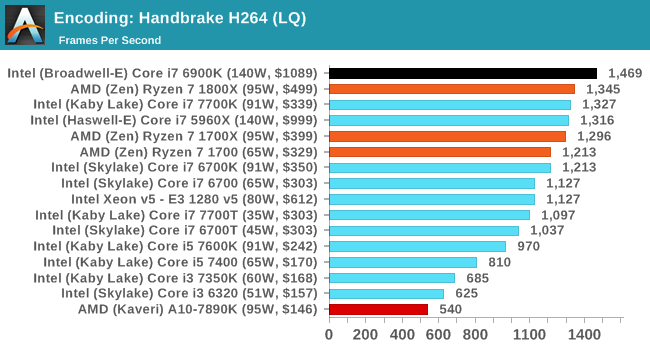
High Quality/Resolution H264: A similar test, but this time we take a ten-minute double 4K (3840x4320) file running at 60 Hz and transcode from Main to High, using the very-fast preset.
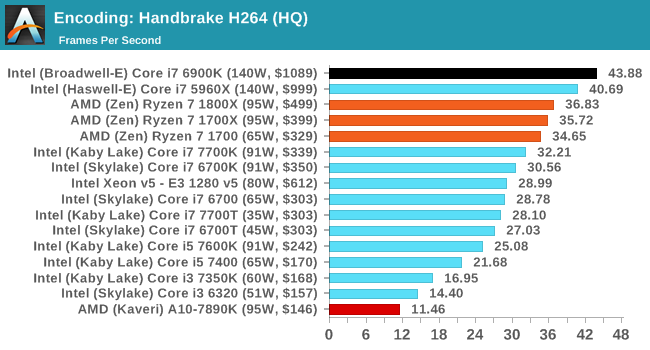
HEVC Test: Using the same video in HQ, we change the resolution and codec of the original video from 4K60 in H264 into 1080p30 HEVC. This causes a dramatic reduction in filesize.
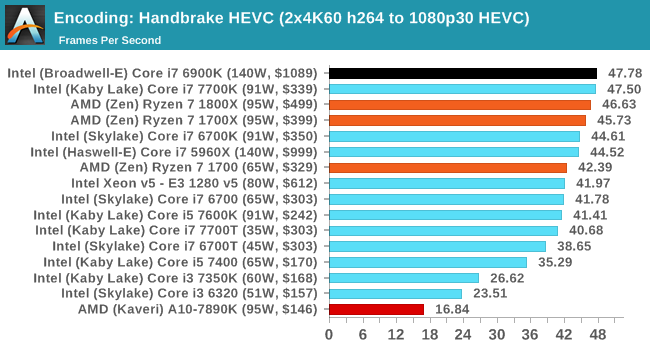










574 Comments
View All Comments
nt300 - Saturday, March 11, 2017 - link
The Ryzen 7 1700 is definitely the gaming choice IMO. The CPU that does well in gaming and amazing at everything else. Windows 10 hasn't been properly optimized for ZEN, so any Benchmarks and Gaming Benchmarks are not set in stone.A2Ple98 - Monday, May 22, 2017 - link
Actually Ryzen isn't for only gamers, is mostly for streamers and professionals. The cores that aren't used for gaming, they are used to encode the video you are stream. As for pro people, they get almost a i7-6900K for half the price.Sweeprshill - Thursday, March 2, 2017 - link
Does not seem to be proper English here ?Sweeprshill - Thursday, March 2, 2017 - link
n/m can't edit comments I supposent300 - Saturday, March 11, 2017 - link
Wrong, ZEN is a new design and quite innovative. Just like the past, AMD has let this industry for many years. More so when they launched the Athlon 64 with the IMC which Intel claimed was useless and a waste of die space. That Athlon 64 at 1000 MHz less clock speed smoked any Intel chip you put it against.My point, ZEN is new, and both ZEN and Intel chips are unique in there own way, might share some similarities, but nevertheless they are different.
nos024 - Thursday, March 2, 2017 - link
Nope. Ryzen will need to drop in price. $500 1800x is still too expensive. According to this even a 7700k @ $300 -$350 is still a good choice for gamers.2011-v3 still offers a platform with more PCIe3 lanes and quad memory channel. I thought about an 1800x and 370 mobo combo, but that costs similar to a 6850k with x99.
Sorry, ill stick to intel this time around. Good that ryzen caused a ripple in price war though.
Gothmoth - Thursday, March 2, 2017 - link
gamer... as if the world is only full with idiotic people who waste their lives playing shooter or RPG´s.nos024 - Thursday, March 2, 2017 - link
Ikr? Whatever makes your world go round man.brushrop03 - Thursday, March 2, 2017 - link
Well playedAndrewJacksonZA - Thursday, March 2, 2017 - link
lol